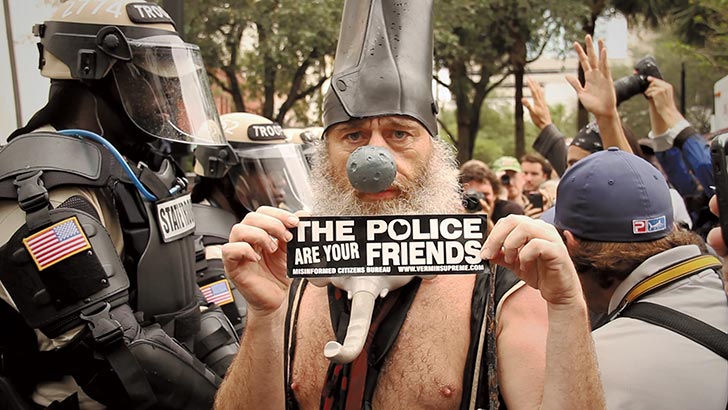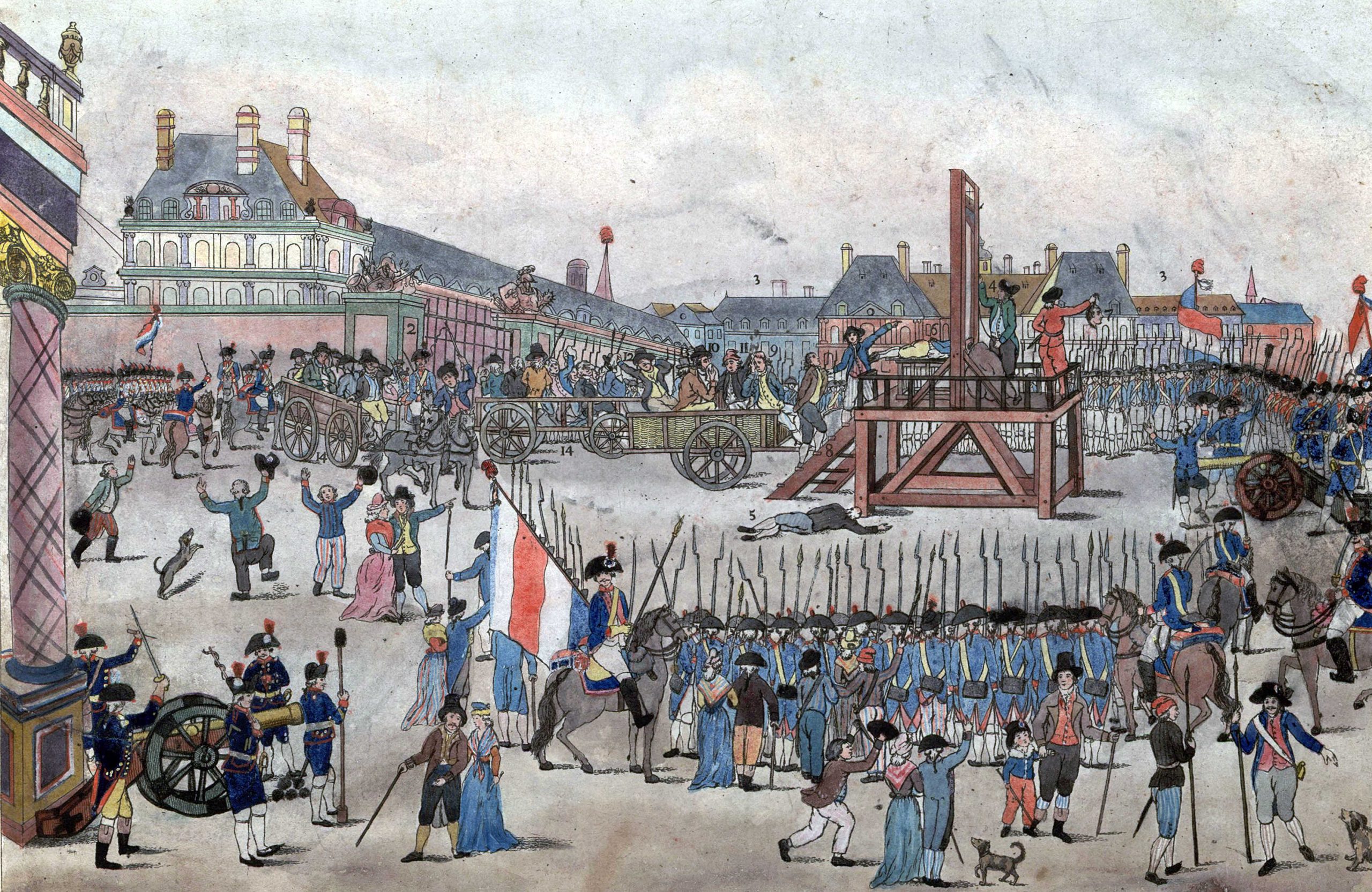As if covid were not bad enough, rapidly disappearing local businesses in California have a new threat: Will their slim earnings be seized by warrant-less sheriffs lying in wait on the road?
It’s like a bad movie script. The complaint filed in federal court by a team of lawyers at the Institute for Justice is 57 pages of what the newer generation calls “cringe”. As a movie script, it would be an eye-rolling page shredder full of shallow, bad acting and naive and puerile dialogue, and it is all played by a troupe of bumbling, corrupt cops. As an anecdote of reality, the story is intensely sad and genuinely frightening.
Imagine yourself watching the movie: the opening scene is a tree-less, rockscaped desert community on the outer Eastern fringes of the Los Angeles Metroplex. Action focuses on an unusual traffic stop: a San Bernardino County Sheriff pulling over an armored car for driving too close to other vehicles in traffic. The deputy comes up to the uniformed driver and asks, “Sir, are you carrying a large amount of cash in your vehicle?” You might imagine Rowan Atkinson as the sheriff. But it is not a joke. The allegorical movie is not scripted to be a comedy.
Actual Highway Robbery
There is an evil and pernicious law on the books. It was once obscure. Few have ever heard of it or felt it. Most of the time it was used in states like Missouri and Alabama to justify stealing cash from out of state, often minority, motorists on the interstates. Now, in California, it is being put to unprecedented use targeting armored cars serving local merchants for bank deposits. It does not matter which businesses the money came from. There is no need for any law to be broken. All money is guilty until proven innocent.
The practice called “Civil Asset Forfeiture” is a federally sponsored practice that allows local law enforcement agencies to seize any amount of cash without a warrant, without charging anyone with a crime, and without any certain requirement to ever have to show evidence that a crime was committed. To avoid returning their loot, federal agencies launder the money for a cut and make it very difficult for people to get their cash back. Most of the time the agency and the feds can just pocket the money without ever having to explain it to a judge. The seizing agency almost always gets to keep their 80/20 split of ill-gotten gains because the procedure to appeal is esoteric, difficult, and severely time-limited.
The law enforcement practice is a “new-ish” one that has until now been enforced with a fairly low profile, but it did bring in a lot of income for departments that opted into using it. Since its inception, Libertarians have been aware of the practice and have complained of its unconstitutional and clearly corrupt purpose. It was born in the 1980’s DARE–drugs and crime craze; one of the final hurrah’s of a century full of ill social and political thought. Fighting civil asset forfeiture has been an uphill battle because the most vulnerable people find themselves victim to these laws. A few years ago, the practice had gotten so out of hand as to draw the attention of major media including The Washington Post and The New York Times. In-depth criticisms also aired on Vice Media and it was even lampooned in a feature bit by John Oliver (see videos above).
An Insane Application of Already Bad Law
In shockingly too many cases, unwitting and innocent victims were left penniless, cell phones confiscated, and even sometimes their vehicle towed. Once they find themselves a ride home (or some gas money), they face impossible bureaucracy just getting an explanation for why they had their money taken. Cops could target middle-class or lower income people who do not have the ability to take them on in court; they just take their money. In many of the more predatory agencies, traffic stops asking “Are you carrying cash?” became as routine as asking for the driver’s paperwork and license.
The Institute for Justice is a libertarian-minded advocacy and law group that has been defending the innocent from highway robberies. They have a group within that specializes in helping the victims of illegal civil asset forfeiture. The three videos above are just a smattering of the cases that “IJ” are actively working on across the country, and they paint a pretty scary story.
In one of the videos IJ released, a man and his family work overtime in Mississippi and save for years to buy a truck to start a business. On the way to buy the truck, police pull the man over and demand to know if he has any money in the car. They take $40,000 from him without explanation.
Another agency does an even worse evil turn to a veteran. The poor fellow is pulled over, and according to the body-cam footage, they took his life savings from him knowing that there was no connection to drugs as they claimed.
In a third IJ case, an entire family has their assets seized across multiple households. Why, are they a family of drug runners? No, but one single, solitary member of the family has a small cannabis business. Yet brothers, sisters, grown sons and daughters are all automatic targets for confiscation of their household accounts through guilt by association. Remember that for law enforcement to confiscate your money, they don’t even have to charge anyone with a crime, just suspect there was one – somewhere.
Your money has no rights. You do NOT get a day in court unless you pay big money for a lawyer; good luck with your accounts frozen. Especially since now you need to worry about how to buy groceries or pay for the gas to get to work.
Illegal Searches are Easier than Legal Ones
Recently, this practice of civil asset forfeiture has started to be applied in California in some very nasty and unprecedented ways. Because they have found a “magic loophole” where they can ignore courts, warrants, evidence, arrests, and any other burden, one extremely corrupt department has become emboldened to unfathomably absurd behavior: if no court can punish them, why are they bothering with a mere $40,000 or the mortgage and shopping budgets of a couple of households?
It is illegal for a police officer to search a car without a warrant or an immediate probable cause to act. In case they happen to pull someone over and notice something that looks like it might be illegal, they can then investigate further… but they have to have a real reason to pull someone over to start with. That reason CAN NOT be because they have a suspicion. Their next step would be to get a warrant if they suspect a crime. Also, the reason CAN NOT be because they want to seize whatever cash is in the vehicle. That would be Highway Robbery.
Right now, the sheriff in San Bernardino County, California is actually systematically pulling over armored cars and taking all of the cash in them, charging no one with a crime. The thought process goes: because marijuana is legal in California, but not with the feds, even though I cannot arrest anyone because I am a California sheriff and have to obey California law, and because any money in any vehicle could be involved in a felony (just not one I can enforce), I should just pull over any armored car I see and assume that the money within is involved in some felonious act in some jurisdiction. ¯\_(ツ)_/¯
Targeting someone, then using a traffic stop as a pretext to look into their car is NOT legal, but that is exactly what is going on in these cases. The armored car company has been targeted. The “traffic stops” are staged. The searches are illegal and plainly corrupt, but how do you prove that the deputies making the traffic stops are doing so as a pretext to confiscate cash?
Bigger Profits Require Bigger Seizures
The real victims of these rampantly corrupt practices are a number of innocent businesses who just wanted to safely get their receipts into the bank. The primary business affected here is the plaintiff in a case that IJ filed in federal court last month.
The armored car company Empyreal is a large cash-courier service that operates in 28 states. They are not drug dealers and do not engage in any sort of drug business. They do (or rather did) operate in California, a state where marijuana is legal. Despite a law that was recently passed to protect banks and cash couriers from prosecution for serving legal cannabis companies, sheriffs claim that the new legislation is enough for all couriers to be suspected drug launderers under federal law.
Oddly, the state law forbids the sheriffs from helping the feds.
You can read the complaint yourself here:
https://ij.org/wp-content/uploads/2022/01/Empyreal_Complaint-filed.pdf
The armored car company has a large customer base with a numerous businesses. For the police, this does not present a problem. . The more cash in the armored car, the better. It is not necessary for the receipts in the armored car to be from a cannabis company, in part or in whole, for them to seize it. Neither does it matter how many different businesses are serviced by an armored car. All the money that they seize is guilty until proven innocent.
When the sheriff hits an armored car, they do not just terrify the armored car company, they terrify all businesses that use armored cars. Anyone using any armored car company, such as 7-11s, mom and pop tamale stands, movie theaters, and even coin and stamp stores could lose all of their cash receipts (or collectible currency) to a seizure in San Bernardino County, California. Maybe later they could prove their money “legit” if they live long enough and can get the resources to sue the federal government.
Targeting Mom and Pop Business
One company mentioned in the complaint, a rolled coin business that sold collectible and “silver rounds” (which are older US-minted coins worth more than 15 times their face value), was lucky in ways no others mentioned were: Empyreal lawyers were able to convince the sheriffs that the sole deposit in the van came from a store they could point at.
The coin shop had a close call but there was extra reason for them to be glad. If the sheriffs refused to talk to the Empyreal representatives or had taken the safe deposit bags anyways, the confiscation receipt may not have listed the weight of the 90% silver coins or collectible value. It might have simply said $10 rolled quarters, actual value would have been lost; and in actual cases like that, they might expect that if a judge ordered a return of their money, they would have been issued a check for only the face value of the coins. In later seizures by the same sheriff against the same armored car company, a different set of merchants were not so lucky.
In the next seizure described in the lawsuit, San Bernardino County Sheriffs noted to one another that they had to leave the money sorted in their barcode tagged bags. They could not combine the money as they counted it, in case someone tries to claim their deposits were “legit”. As every merchant’s receipts in the vehicle were seized, the sheriffs did not have any way to know if any of the money was from a legal cannabis company, the coin shop or even the corner dry cleaner.
In latter incidents, the San Bernardino County Sheriffs refused to talk to the Empyreal executives about ownership of the cash. They were uninterested in hearing that the money they were confiscating were from legal and legitimate businesses and the sheriffs even forbade the Empyreal lawyers from talking to the handcuffed employees, who sat detained during the long money count. The sheriffs figured out that as long as they never had to explain themselves, no one could prove that they were breaking the law.
Cut and Print!
As an unrelated aside, but ironically, Wes Craven's 1977 cult classic, "The Hills Have Eyes," was shot nearby.
It is a scene you might expect in a dystopian future sci-fi flick: a pandemic wrecks the global economy. As the world’s supply chain and labor markets fall apart, desperate, armed bands of former police turn into rogue warlords oppressing and robbing all that mistakenly travel down the wrong road.
State licensed and regulated armored car employees are pulled out of the vehicles, detained, and have all of their presumably registered weapons, communications gear and cell phones confiscated. The Sheriffs circle the vehicle knocking out all of the cameras mounted inside and out and then… they start celebrating, high-fiving, taking hero shots, breaking open strong boxes, and counting the cash.
At first cocky about their clever plan and big score, eventually the sheriff’s deputies counting their loot become a little disappointed. This is the third time they have hit the same armored car company. They expected more; even proclaiming they had hoped for closer to two million dollars in total for all the seizures. All the time through their ups and downs, while voicing their congratulations and expectations, with all their ideas, good and bad, fully debriefed on each other, the deputies were unaware that they had missed a camera inside the armored car. It was still recording video and audio.








